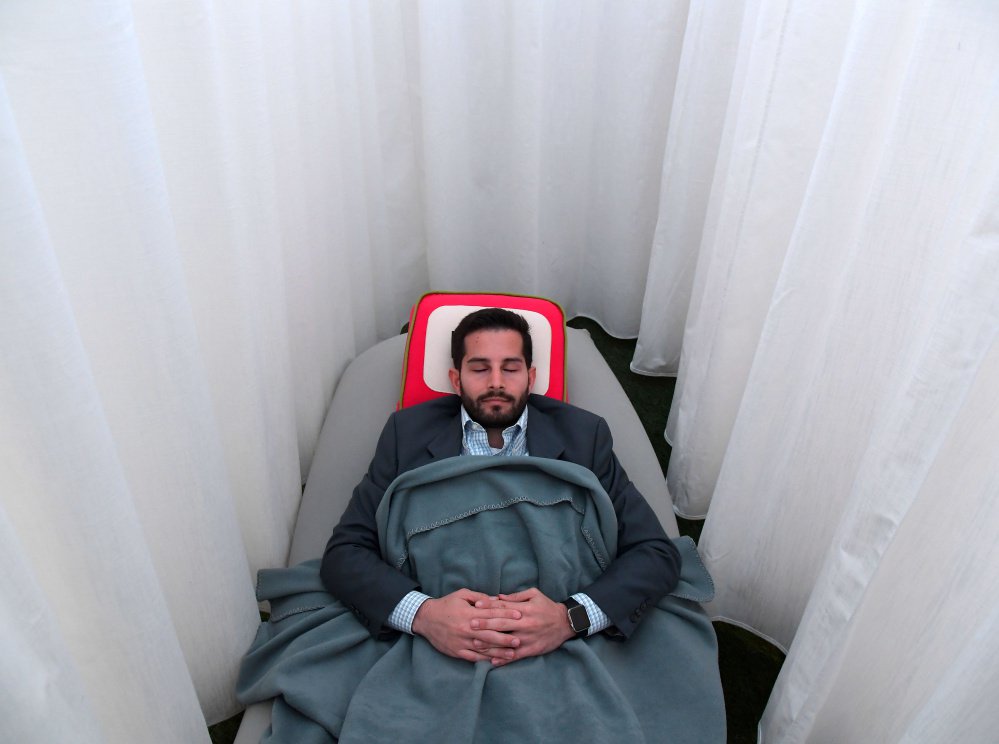President Trump prides himself on getting by with just four or five hours of sleep at night, which leaves him plenty of time early in the morning to scan cable TV news and tweet before going to work. During last year’s rough-and-tumble campaign, he scoffed at “low-energy” rivals Jeb Bush and Hillary Clinton for carving out nap time.
“No naps for Trump! I don’t nap,” the 71-year-old Trump bellowed during one campaign stop. “We don’t have time.”
Yet history is replete with leaders and warriors such as Napoleon, Winston Churchill and John F. Kennedy who routinely napped in the afternoon, regardless of the crises swirling around them. “Nature has not intended mankind to work from eight in the morning until midnight without the refreshment of blessed oblivion, which even if it only lasts twenty minutes, is sufficient to renew all the vital forces,” Churchill once wrote.
And increasingly, science is siding with the nappers, with researchers finding that short sleeps not only are beneficial to drowsy individuals and the elderly but also are essential to public health, public safety and productivity.
“Now, I don’t know Donald Trump nor have I done sleep studies on him,” said Philip M. Alapat, an assistant professor specializing in pulmonary disease and sleep disorders at the Baylor College of Medicine in Houston. “But the number of people that can truly function optimally with four or five hours of sleep on a nightly basis are vanishingly few.”
NEURONS COMPROMISED
An international team of neurologists published a study showing how sleep deprivation can disrupt brain cells’ ability to interact and communicate. A night of lost sleep can result in temporary mental lapses that impair memory and distort visual perceptions, according to the study published in early November in the journal Nature Medicine.
Itzhak Fried, the senior author of the study and a professor of neurosurgery at the David Geffen School of Medicine at UCLA and Tel Aviv University, said that his team discovered that “starving the body of sleep also robs neurons of the ability to function properly.”
In a recent study, University of Pennsylvania researchers found that a moderate nap in the afternoon coincided with improvements in people’s thinking and memory prowess and may have helped the brain perform as if it were five years younger. The study, by the Journal of the American Geriatrics Society, focused on 3,000 older people in China and examined whether those more inclined to take brief naps performed better on mental ability tests.
Afternoon napping is prevalent among older adults in China and is considered part of a healthy lifestyle. Scientists found that people who took a nap after lunch did better on the mental agility tests than those who did not sleep in the middle of the day. Overall, 60 percent of people in the study slept after lunch, for an average nap of 63 minutes. The study concluded that one hour was the optimal nap length and that people who had much longer or shorter rests – or no naps at all – performed up to six times worse on memory and math tests.
SLEEPLESS AND EMBATTLED
Over the years, sleeplessness has quietly grown into a pervasive problem. One-third of American adults regularly get too little sleep, according to the Centers for Disease Control and Prevention. Nearly half of all American adults complain that poor or insufficient sleep affects their daily activities at least once a week, according to the National Sleep Foundation.
Without at least seven or eight hours of sleep at night, Americans face a tough slog getting through the day and leave themselves more vulnerable to illness. Scientists have linked sleep deficiency to many chronic health problems, including heart and kidney disease, high blood pressure, diabetes, stroke, obesity and depression.
While the relationship between sleep deprivation and adverse health consequences is not fully understood, according to Alapat, a lot of it has to do with denying the body the rest it needs for healing and to refresh the neurons in the brain, as well as to fight off poisonous substances.
The sleep-deprived also perform worse at learning, memory, and creative and analytic reasoning – a special problem for chief executives and decision-makers. And nearly 40 percent of adults have reported falling asleep without meaning to at least once a month, according to NIH. That’s a recipe for car crashes, aviation and ship accidents, industrial mishaps and even medical malpractice by exhausted hospital interns.
The need for brief R-and-R in the middle of the day has given rise to a workday sleep industry, in which office workers downtown or travelers at airports can buy some quiet time for “power naps.”
Recharj, a meditation and napping salon that opened a year ago in Washington, D.C., has had more than 7,000 visitors. About half of them have availed themselves of a 25-minute power nap in cocoons complete with head pillows, eye shades, blankets and optional earplugs.
Copy the Story LinkSend questions/comments to the editors.



Success. Please wait for the page to reload. If the page does not reload within 5 seconds, please refresh the page.
Enter your email and password to access comments.
Hi, to comment on stories you must . This profile is in addition to your subscription and website login.
Already have a commenting profile? .
Invalid username/password.
Please check your email to confirm and complete your registration.
Only subscribers are eligible to post comments. Please subscribe or login first for digital access. Here’s why.
Use the form below to reset your password. When you've submitted your account email, we will send an email with a reset code.